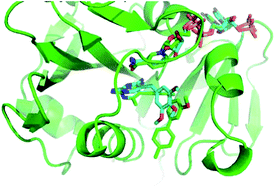Antifolates as effective antimicrobial agents: new generations of trimethoprim analogs
Abstract
Over the past six decades, the

* Corresponding authors
a
Department of Pharmaceutical Sciences, University of Connecticut, 69 N. Eagleville Rd, Storrs, CT, 06269 USA
E-mail:
amy.anderson@uconn.edu, dennis.wright@uconn.edu
Fax: +1-860-486-6857
Tel: +1-860-486-6145
Over the past six decades, the

 Please wait while we load your content...
Something went wrong. Try again?
Please wait while we load your content...
Something went wrong. Try again?
W. Zhou, E. W. Scocchera, D. L. Wright and A. C. Anderson, Med. Chem. Commun., 2013, 4, 908 DOI: 10.1039/C3MD00104K
To request permission to reproduce material from this article, please go to the Copyright Clearance Center request page.
If you are an author contributing to an RSC publication, you do not need to request permission provided correct acknowledgement is given.
If you are the author of this article, you do not need to request permission to reproduce figures and diagrams provided correct acknowledgement is given. If you want to reproduce the whole article in a third-party publication (excluding your thesis/dissertation for which permission is not required) please go to the Copyright Clearance Center request page.
Read more about how to correctly acknowledge RSC content.
 Fetching data from CrossRef.
Fetching data from CrossRef.
This may take some time to load.
Loading related content
